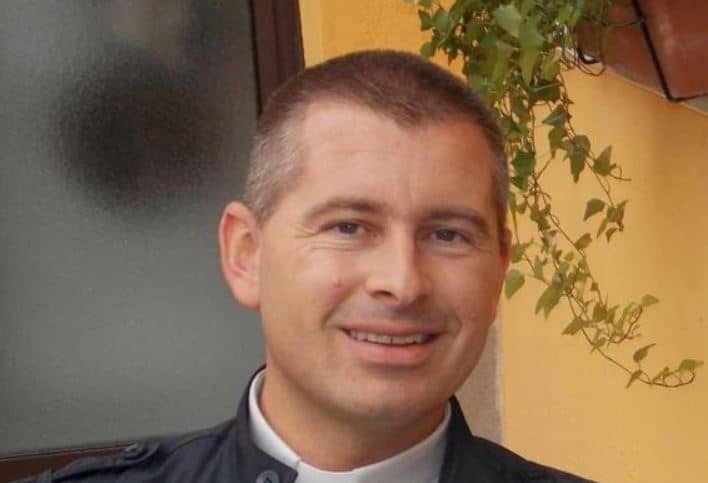ROME – Once again, the Italian bishops have taken a stand against the national government’s restrictive policies on undocumented immigrants, urging the country’s ruling populist coalition to put the dignity of the human person at the center of political life.
“Every dead person at sea or in the desert, or because they suffered violence in detention, is an offense against humanity,” said Cardinal Gualtiero Bassetti of Perugia, head of the Italian Bishops’ Conference (CEI), speaking to reporters after an event at the Jesuit-run Centro Astalli, which assists migrants and refuges, on April 4.
“We take on our own responsibility, but institutions must take theirs,” he said.
RELATED: Italy’s populist regime defies Pope Francis anew over immigration
The populist party Lega Nord (“Northern League”), which dominates Italy’s governing coalition, pushed through a “Security Decree” in September that set forth a sweeping overhaul of the procedures for asylum-seekers wishing to stay in Italy.
A residency permit, necessary to remain on Italian soil, is no longer available to asylum-seekers except in “special circumstances.” The decree increases the amount of time refugees may spend in immigration centers and border hotspots, as well as the amount of money necessary to ask for residency or marriage licenses.
In big cities, police officers now can use tasers against immigrants resisting arrest, and more funds will be devoted to the deportation of undocumented immigrants.
Most importantly, immigrants can now be expelled from Italy if they’re initially convicted of any crime committed in the first degree, even if they’re appealing. The number of reasons that could lead to cancellation of refugee status has also multiplied.
This law, Bassetti said, “is inadequate and must be reviewed and integrated, because nothing can be omitted when we are talking about the respect for the life and dignity of the human person.”
The Italian Minister of the Interior and President of Lega Nord, Matteo Salvini, also closed all Italian ports to vessels carrying immigrants in an effort to combat human trafficking.
“Migrants must be rescued and saved, not pushed away or blocked in unsafe third countries,” Bassetti said. “The influx has diminished, but who will take responsibility for those who died at sea? Sending them back to detention centers in Libya can also be a death sentence.”
The event at Centro Astalli was organized to present its 2019 annual report before an audience including Vatican and Italian representatives.
According to Jesuit Father Camillo Ripamonti, president of Centro Astalli, hostility toward immigrants stems from a cultural environment that views them as a threat to safety and stability. It’s reinforced by the Security Decree, he said, which “slows the integration process and risks creating more insecurity and irregularity.”
The Permanent Council of CEI, which met April 1-3, held a press conference near the Vatican on Thursday where immigration was high on the agenda.
“Even at the cost of a certain rate in popularity, the Church feels the need to actively contribute to a culture of integration and to overcome the indifference that exists before the tragedy of those who disappear in the Mediterranean or are tortured in refugee camps in Libya,” an April 4 press release states.
The Italian bishops dedicated time to addressing the immigration situation in the country, said Father Stefano Russo, CEI’s general secretary, and the “changes that occurred and have created new problems.”
The state’s financial contributions for the welcoming of immigrants have diminished as well as the services, Russo added, putting a strain on local parishes.
“We as a Church cannot stop at the economic factor,” he said. “We must have a full-rounded attention that stems from the principles that these are human beings.”
Concerning dialogue with the governing coalition, Russo said that “he’s satisfied, but it can always get better,” adding that the Italian Church wants to be “vigilant and responsible and bring forward situations that require more attention.”
Immigration is not the only issue on the Italian bishops’ mind, as they also prepare to approve new guidelines on sexual abuse and the protection of minors during their plenary assembly in May.
RELATED: Italian bishops refine anti-abuse guidelines without victim input
RELATED: Italian Church to create national anti-abuse center
Russo said that personal stories presented by two clerical abuse victims to the council were “very touching,” and said he was struck by “the courage that they had to emerge from their isolation.”
He said the new guidelines, which will round out an early set created in 2014, will focus on “promoting a culture of prevention.” He praised Pope Francis’s recent motu proprio enacting child protection legislation in Vatican City and the Roman Curia, saying that it has many things in common with the CEI guidelines.
“Our intention is to favor reporting” of abuse, Russo said, and “active collaboration with judicial authorities.”
“We wish to move in the direction of ascertaining the truth,” he said.















